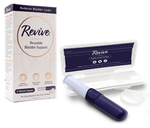February 26, 2020
Light Bladder Leakage Odor
It’s kind of a social situation nightmare - you’re out with friends, or at work, or shopping somewhere and you keep smelling something and looking around to find the source only to come to the realization that the odor is coming from YOU. No, it’s not because someone forgot to clean up their dog’s mess or you forgot to put on deodorant, it’s actually because of those light bladder leaks! Not only are light bladder leaks (sometimes called LBL) embarrassing in the moment, but dealing with the lingering smell afterward can be just as (or even more) embarrassing, especially if you’re out in public or with friends. But people that struggle with leaks cannot be expected to simply hide away for the rest of their lives to prevent odor! Luckily, there are plenty of tips and products for both women and men to help reduce bladder leaks and the odor associated with them.
The term “light bladder leak” is not quite as simple as it seems. The truth is, not all leaks are created equal, and the causes and triggers for the accidents can vary depending on the type you’re diagnosed with. According to the Continence Foundation, the different types of urinary incontinence include the following: Stress Incontinence - Sometimes referred to as SUI, Stress Incontinence can describe the leaks that occur when the bladder or urinary tract is put under stress, usually due to physical action or movement. People that experience SUI leak when they cough, laugh, run, jump, or perform any kind of motion where pressure is placed on the bladder or urinary tract. Generally, SUI is caused by the pelvic floor being weakened or damaged from things like childbirth or surgery, but can also develop in people that are overweight or are chronically coughing. Urge Incontinence (OAB) - Urge incontinence can also be referred to as Overactive Bladder, or OAB, as the leaks are the result of the bladder contracting (causing the “urge” feeling) despite how full or empty it actually is. It’s hard to pinpoint one cause for OAB, but some risk factors include damage to the spinal cord, having a stroke, a UTI, or bladder inflammation. Mixed - Sometimes, there can be two forms of incontinence responsible for bladder leaks, usually stress and urge. This is most commonly seen in women.
Overflow Incontinence - Overflow Incontinence occurs because the bladder is unable to empty itself completely or correctly, and allows residual urine to build up over time which leads to involuntary leaks. People that are affected by overflow incontinence find it hard to start going, have a weak flow when going, and may still dribble after going (or even all the time). Overflow is caused by the inability of the bladder to squeeze properly, usually due to nerve or muscle damage or disease. Functional - This kind of incontinence occurs because an individual is unable to make it to the bathroom in time. This can be caused by a physical disability or obstacle, or mental disability like Alzheimer’s.
Cranberry Juice - cranberry juice keeps urine naturally acidic, which can reduce odor, according to the National Association for Continence. Deodorizing Tablets - “Internal deodorant tablets such as Derifil® or Nullo® have proven useful to many incontinent people. The deodorizing tablets are taken by mouth, and the manufacturers’ instructions advise that it takes time (2 to 14 days) to get satisfactory results.” In addition, Vitamin C supplements can also be used to neutralize urine odor. Keep Your Body Clean - clean your body, your clothes, and incontinence products/devices correctly and often. Vinegar has been found to dissolve urine crystals better than bleach. Try a solution that is 1 part vinegar, two parts water for incontinence devices. Make sure you’re changing products often and keeping soiled items contained until they can be cleaned or discarded. Keep Your Living Situation Clean - At home, wash bedding and other surfaces often, as well. Try finding light air fresheners designed to eliminate, not just cover up odor.



 What are Light Bladder Leaks?
What are Light Bladder Leaks?
